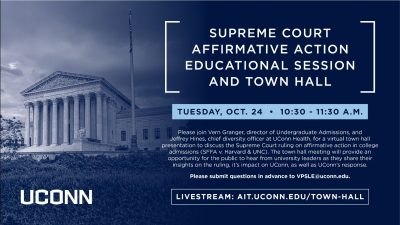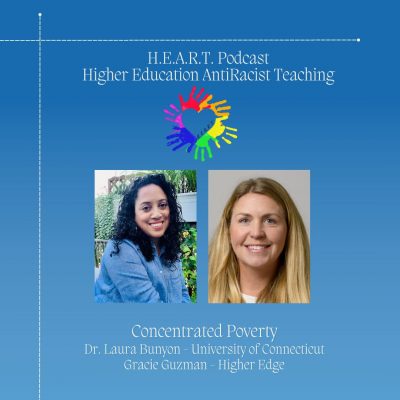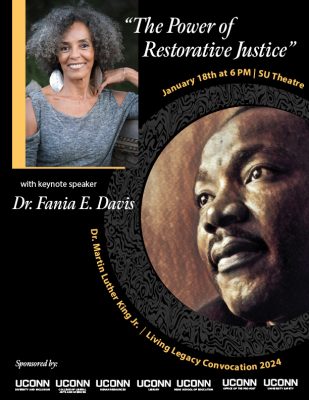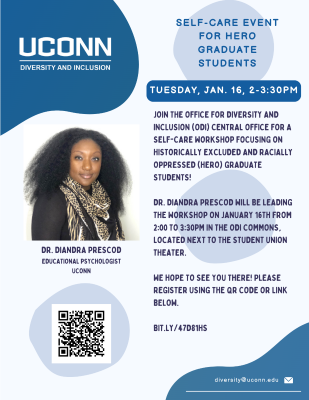To the UConn Community:
The Office for Diversity and Inclusion and the Provost’s Office would like to remind you of several celebrations, commemorations, and moments of raising awareness for members of our community during the month of February:
Heritage Month Celebrations:
Black History Month (February): Black History Month celebrates Black and African American history, culture, achievements, and excellence. It also draws attention to the lived experiences of Black and African Americans within the United States, including by celebrating Black and African American communities and creating awareness about issues these communities face. This celebration began in the United States in 1926, when Association for the Study of African American Life and History (ASALH) head Dr. Carter G. Woodson recommended that schools use the second week of February—which holds the birthdays of Abraham Lincoln and Frederick Douglass—to ensure students are exposed to Black history. Fifty years later, this week was expanded into a month-long celebration. Every president since 1976 has proclaimed February to be Black History Month.
The theme for this year’s Black History Month is “African Americans and the Arts.” According to ASALH, this theme centralizes the fact that “African American artists have used art to preserve history and community memory as well as for empowerment. Artistic and cultural movements such as the New Negro, Black Arts, Black Renaissance, hip-hop, and Afrofuturism, have been led by people of African descent and set the standard for popular trends around the world.” At heart of this theme is the recognition and celebration of Black and African American artists whose work has shaped and transformed the world through resistance, creativity, and community.
Black History Month is a time to celebrate the fullness of Black and African American history and culture, though such celebrations cannot—and should not—be limited to a single month. At UConn, we believe that Black history, culture, and excellence should be celebrated every day. The University aims to provide opportunities for celebration, community building, and education through the African American Cultural Center (AACC) and Africana Studies Institute, as well as through a course on Anti-Black Racism.
We invite the entire UConn community to join in celebrating this year’s Black History Month. The AACC’s opening Black History Month event is an evening with actor Nia Long, called “A Conversation with Nia Long: Longevity and Legacy—A Black Woman’s Journey in America & Hollywood.” It will take place on February 1 at 6 p.m., at the Student Union Theatre. Space is limited, so please register for this exciting event here!
Please check the AACC’s Black History Month page for a full calendar of events!
Cultural and Federal Holidays
National Freedom Day (February 1): National Freedom Day celebrates the end of slavery in the United States and recognizes the United States as a symbol of liberty. National Freedom Day was proposed in 1941 by Richard Robert Wright, Sr. to commemorate the day President Lincoln signed a Congressional resolution stating that “Neither slavery nor involuntary servitude, except as a punishment for crime whereof the party shall have been duly convicted, shall exist within the United States, or any place subject to their jurisdiction.” This resolution would become the Thirteenth Amendment on December 18, 1865. National Freedom Day became a national holiday in 1948.
World Hijab Day (February 1): World Hijab Day was started in 2013 by Nazma Khan, who wanted to foster religious tolerance and understanding by inviting all women to wear a hijab for one day each year. In the decade since, World Hijab Day has grown to promote awareness, education, and empowerment in order to dismantle bigotry, discrimination, and prejudice against Muslim women. World Hijab Day celebrates religious tolerance and women’s rights around the world.
Lunar New Year (February 10): February 10 marks the start of Lunar New Year 2024, the Year of the Dragon. Lunar New Year has been observed for thousands of years and symbolizes the welcoming of a new beginning and a time of reunion with family and friends. For the Asian, Asian American, and Pacific Islander communities at UConn, it marks an occasion to celebrate cultural backgrounds, experiences, and identities. On Lunar New Year, we recognize and honor the rich culture, history, and experiences of Asian, Asian American, and Pacific Islander communities, which make up such a significant portion of the UConn community. We recognize that the last few years have been especially difficult for these communities as they have borne the brunt of increases in racially based harassment and violence. We believe that these communities make UConn stronger. We are thrilled to celebrate them and encourage all in our community to participate in this month of festivities. Check out the Asian American Cultural Center for this year’s Lunar New Year Events.
Valentine’s Day (February 14): Valentine’s Day is celebrated annually on February 14. The origins of the holiday are disputed; some accounts point to pagan fertility festivals while others point to St. Valentine, an early Christian saint martyred for performing weddings in defiance of a ban on marriage for military-aged men. Today, Valentine’s Day is typically regarded as a celebration of romantic love.
Presidents Day (February 19): President’s Day, also known as Washington’s Birthday on the federal level and for the State of Connecticut, is celebrated in the United States on the third Monday of February. Established in 1879 to honor Washington’s February 22 birthday, Presidents Day was moved to the third Monday of February in 1970 as part of the Uniform Monday Holidays Act to create more three-day weekends for workers. The holiday now celebrates all US presidents, past and present.
Religious Holidays
Candlemas (February 2): Candlemas is a Christian holiday that occurs 40 days after Christmas. Also known as Presentation of the Lord, Candlemas commemorates Jesus’ presentation at the Temple. For Catholics, in particular, Candlemas honors the purification of the Virgin Mary. Many Orthodox Christians celebrate by having beeswax candles blessed at church or at home. Candlemas is celebrated as Día de la Candelaria in many Spanish speaking countries. Whoever finds the baby figures hidden inside the Rosca de Reyes cake from El Día de Reyes/ Three Kings Day is obliged to host the Candelaria gathering. Candlemas is halfway between the December Solstice and the March Equinox, marking the halfway point for winter.
Mardi Gras (February 13): Mardi Gras, or Fat Tuesday, is a Christian holiday and global pop cultural event. Mardi Gras occurs the day before the start of the Christian Lenten season on Ash Wednesday. Fat Tuesday gets its name from the custom of using all the remaining eggs, milk, and fats in a household before beginning a Lenten fast. Mardi Gras is also the end of Carnival season that starts on Twelfth Night. It is usually celebrated with elaborate parades and the eating of king cake. Some of the most well-known Mardi Gras celebrations are held in New Orleans, Rio (Brazil), and Venice (Italy).
Ash Wednesday (February 14): Ash Wednesday is a Christian holiday of fasting, sacrifice, and prayer. Celebrated by Catholics, Orthodox Christians, and many Protestant denominations, Ash Wednesday marks the start of Lent, a 40-day period of repentance, fasting, and reflection leading up to the celebration of Easter. For Christians, Lent represents the 40 days that Jesus spent in the wilderness, where he fasted and resisted temptation. Though celebrations vary by place and denomination, Lent is typically seen as a season for intentionally focusing on Jesus’s life, ministry, sacrifice, and resurrection.
We welcome the celebration of each of these holidays on our campuses and encourage support for those requiring accommodations. You can find information and guidance about academic accommodations for religious observations on the Provost Office’s webpage.
To see more information about resources and events happening this month and throughout the semester, please visit our events page at www.diversity.uconn.edu/events. ODI writes these letters in collaboration with our partners across the UConn system. If we inadvertently omitted a cultural or religious holiday, please let us know by emailing us at diversity@uconn.edu.
If you would like to receive our ODI Weekly Digest, where you can receive regular updates about upcoming events, programs, and opportunities, subscribe here!
Sincerely,
Frank, Anne, and Jeff
Frank Tuitt
Vice President and Chief Diversity Officer
Anne D’Alleva
Provost and Executive Vice President for Academic Affairs
Jeffrey F. Hines, MD
Associate Vice President and Chief Diversity Officer, UConn Health






